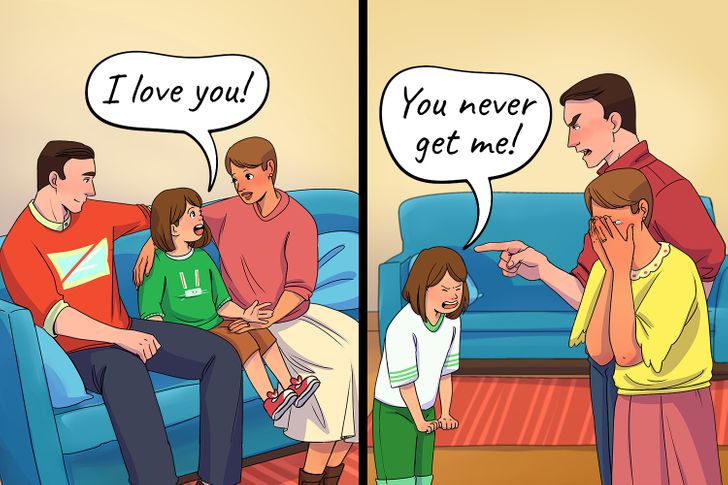Raising children in the 21st century can be extraordinarily complicated for parents from all different walks of life.
After all, parents in today’s day and age don’t just have to worry about regular bullying, they also need to be prepared to tackle the challenges of cyberbullying, which has grown in recent years due to more people spending lots of time online including teens.
Cyberbullying can often be a gateway to bullying in real life according to a recent study, underscoring the need for parents to take an active role in preventing their kids from being targeted.
When the going gets really tough and cyberbullying spills into everyday life in the form of real bullying, there are several telltale signs that you might notice among your children.
These signs may be tough for some parents to witness which could lead to denial or ignoring them, but doing so could only exasperate the problem in the long run.
Many teenagers and children can become standoffish when asked about these signs by their parents, so be sure to be a patient and active listener as much as possible to avoid turning your kids off to sharing what may be going on with them.
Here are the top eight telltale signs of a potential bullying problem at school, along with what you may be able to do as a parent to support your child, and to prevent or stop bullying from ever happening in the first place.
1. Avoidance of Friends and Social Circles-

If your child always seems to choose staying home over going out or spending time with friends, it could be a sign that they have been bullied or are afraid of being bullied.
Children need a lot of alone time for growth and to process the turbulent emotions of youth, but when it becomes a long-term thing and they often seem fearful of social situations, there may be something extra happening behind the scenes.
2. A Sudden Drop in Self-Esteem-
Children who have been bullied oftentimes become afraid of retaliation even when there is no need for such a fear. They may suddenly start speaking to you with their head down in a soft voice instead of being confident and looking you in the eye.
They also may exhibit self-loathing behavior and lose interest in succeeding at their schoolwork or activities such as sports that they would otherwise be more interested in.

3. Lost or Damaged Belongings-
According to YouthTruthSurvey.org, 29% of those who are bullied have been hurt physically. If they have missing or damaged belongings such as clothes, school supplies, gadgets or similar items, it could be a sign that they are being picked on and preyed upon.
4. Trouble Sleeping or Nightmares-
Research shows that kids who are being bullied may suffer reduced sleep quality as a result. Difficulty sleeping at night and frequent nightmares could be among the signs, so be sure to check in on your kids if you can without waking them.
5. Withdrawal From Family Interactions-

According to recent research, about 19% of students who have been bullied report strained relationships with family members. If your child suddenly loses interest in socializing with you or the rest of the family, it could be a sign.
6. Asking for Increasing Amounts of Money or Things-

Bullies may continually demand, and take, more money from their victims. If your child continually asks you for money, or even a second lunch or more food items that they otherwise wouldn’t eat, they could be busy paying a bully’s ransom.
7. Unexplainable Injuries-
Sudden bruises, wounds or scars could be telltale signs that your child is being bullied. If this is the case, you may want to consider enrolling them in a self defense course or asking them how their friends at school are doing to get a broader view of the situation and whether they may be at-risk or not.
8. An Abrupt Change in Attitude-

If a child seems to lash out at their parents or even their siblings in unexpected ways, it could signal that they are having trouble with bullies. Children who are bullied may try to take their aggression out on other people in other ways.
How to Stop Bullying, Or Prevent It Before It Starts
According to the website StopBullying, there are four main ways to stop, control or prevent bullying from happening in the first place.
1. Communicate with your child. Learn how to speak to them from the heart and leave plenty of room for listening instead of judging or prying into their life. When they trust you enough to confide in you, they will be more likely to do so.
2. Ask your child if they would be interested in trying new interests or hobbies. Martial arts specifically can be excellent for instilling confidence and deterring bullies, as is any activity that will allow your child to make friends in a healthy and constructive group setting so that he or she has strength in numbers.
3. Be a good example for your kids. Show kindness, respect, humbleness, assertiveness and confidence. The more you grow in these areas and give your child the space to do the same, the better off he or she will be in the long run.
4. Thoroughly explain to your child what bullying is and show them examples if possible. Discuss how best to handle the problem so your child will be prepared. This way, the child will be better equipped to recognize bullies and avoid them or stand up to them, preferably with the help of their peers, teachers or administrators whenever possible.
This article first appeared on the website Brightside.Me and can be read in its entirety here. Thank you for reading, and please share with anyone you think could benefit from this information!




